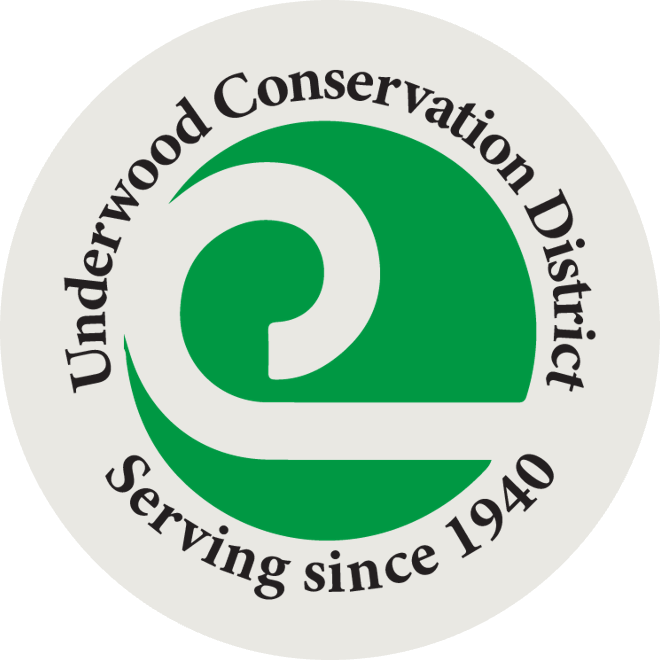Working with Conservation Districts to Adapt to Climate Change
What can the local conservation district do to help your land adapt to climate change?
Not very long ago, a withering drought struck America, and the 1930s Dust Bowl inflicted hardships on a continental scale. One of the efforts launched then to improve lands and waters was to organize local conservation districts. This was the germination of Underwood Conservation District. These days, more than 80 years later, UCD is working to help local landowners and residents respond to a new challenge - climate change.
Managing local effects starts at home – whether that’s a backyard, a farm, or a family’s forest property. Heat domes, droughts, bigger wildfires, atmospheric rivers, and erratic seasons – these are some effects of climate change that are already with us. Underwood Conservation District is thinking about how to help Columbia Gorge-area landowners and residents keep their forests, farms and natural resources thriving through this time of change and challenge.
What can a person or a family do to keep lands and waters healthy? That’s an ongoing question. UCD suggests there are some important actions to mitigate for and adapt to expected climate impacts.
On a positive note, managing for climate change to some extent is simply good management. Growing healthy, diverse forests and wildlife habitat helps a landscape be more resilient to catastrophic wildfire while also storing carbon for the long-term. Farming that focuses on soil health can store significant amounts of carbon while also storing moisture longer, resisting pests and disease, and improving crop productivity. Farmers and gardeners who can increase efficiency and conserve irrigation water are helping protect invaluable water resources to resist impacts of drought. Whether landowners have an interest in improving soil health, maintaining reliable irrigation water sources, or protecting their community from a catastrophic wildfire, these practices support community resilience in the face of climate change.
As UCD continues to support landowners in the best management of natural resources, some of our new and existing programs also directly tie to impacts from climate change.
UCD has offered a long-standing “Firewise” program to assist homeowners in understanding the risk of wildfire and support activities to reduce that risk. This is most useful in the “home ignition zone,” but certainly applies to larger-scale forest management and fuels reduction. As we experience longer wildfire seasons, and trees and other vegetation undergo drought and heat stress, along with more human presence and home building in the woods, it’s never been more important to prepare for wildfire.
UCD also supports farms and farmers in a variety of ways, and we’re diversifying our services in the face of erratic weather, plant stress, threats of new pests and concerns with water limitations. Healthy soil can hold more moisture longer, while resisting pests and disease and increasing productivity. We provide a soil testing incentive every spring to enable better decision making around soil health. We also offer tools and resources to better manage soil, including soil moisture monitors, a manure/compost spreader, and a no-till drill. UCD is excited to unveil a new Farm Tool Library, expected to open in spring of 2022! This new program will provide a wide range of conservation-related farm tools to enable best practices and support farm viability. We are just getting this set up, so stay tuned for more details as spring nears.
Meanwhile, residential homeowners can participate in our newly-developed Yard By Yard program. By participating in this program, backyards and property edges help to conserve water, protect soil, and create habitat and biodiversity. These are all key aspects of adapting to climate change.
We promote native plant landscaping at all scales, as native plants are best-adapted to local conditions and provide diverse habitat for wildlife. As we experience changes in the weather, drier hotter summers and wetter winters, we can recommend plant species that are more resilient to these environmental stressors. We also continue working with streamside landowners in supporting fish habitat and stream health, especially in light of drought stress, limited streamflows and high stream temperatures. Protecting or enhancing native streamside vegetation can be one of the most important things for landowners to do.
UCD offers these services described above, along with technical assistance and connections to other resources and expertise. We also have a small-scale cost share program to support projects. Don’t hesitate to reach out to us for more information on any of these issues. And also, take a moment to tell us more about your needs and how we can help you during these changing times. We are always eager to learn more from the area’s landowners and land manager; send direct feedback to Dan Richardson, UCD’s Climate & Community Resilience Lead: dan@ucdwa.org
How can UCD help you manage your land and resources going into the future? What programs or projects would be helpful to you? Together, we can work to meet the needs of farmers, families, and natural resources.
“The best way to predict the future is to create it.” Abraham Lincoln
